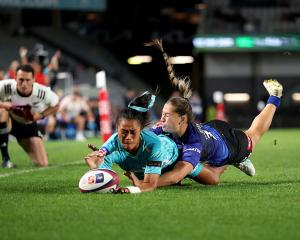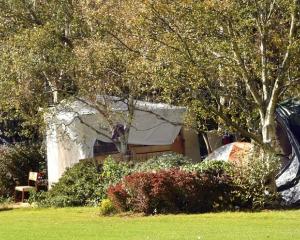
Few speeches in the House have been as preliminary as Dunedin Labour MP Rachel Brooking’s second-reading speech on the Local Government (Water Services Preliminary Arrangements) Bill.
Ms Brooking had been primed and ready to deliver her riveting dissertation on pipes and treatment stations some weeks beforehand but the House had, inconsiderately, gone into recess before she got the call to speak.

If that was Ms Brooking’s preliminary, Wednesday was her day of jubilee, as Parliament buckled in for what proved to be an exceptionally long committee stage — in which Ms Brooking played a leading role.
The Bill, somewhat confusingly for being the preliminary arrangement, is actually the second rather than the first water Bill the government has introduced.
It gives councils and territorial authorities a year to draft and submit a "water services delivery plan" for approval — a plan which must set out how they will deliver "financially sustainable water services" as well as meeting health and other regulatory standards.
This is, of course, the yang to Labour’s Three Waters yin, legislation Ms Brooking played a significant part in drafting and passing, so you could bet your bottom dollar that she had plenty of questions of Local Government Minister Simeon Brown regarding the whole shebang,
"As a former lawyer, it’s very useful, always, for the minister to be able to explain what the legislation is supposed to be doing for both lawyers and law students and anyone else who has to come across a Bill — judges as well," Ms Brooking said, before demanding further details of clause 3, section 1, section 2 (a), section 2 (e), and so on and so on.
"It seems highly ironic, given, in this case, there is a requirement from central government to make these plans, and I can’t see — certainly in part 1 — that there will be any funding from central government for those plans. So, again, a comment on that would be useful."
"It’s a long list," her Labour colleague Deborah Russell chipped in as Ms Brooking moved swiftly on to interrogate clause 5, subclause 5, section 138, and clause 6, schedule 1 and somesuch.
"Somesuch. That’s a lawyer’s word," Act New Zealand list MP Simon Court chipped in, to be told "I’m allowed to say ‘somesuch’, Mr Court."
"Who says ‘somesuch’ in 2024?," Mr Court persevered.
"I apologise to Mr Court, who’s taken offence at ‘somesuch’," a not-at-all repentant Ms Brooking replied before plunging on down her lengthy list.
All that diligence was not well repaid, however: Mr Brown dismissed most of her questions as relating to different parts of the Bill than were up for debate at that moment — although he did, at least, answer Ms Brooking’s question on schedule 1. Or somesuch.
Undeterred, Ms Brooking was soon back for more, although ironically, given her second-reading travails, the dinner bell intervened before Mr Brown could answer her questions.
She was quick off her feet once the House resumed though.
"Just very quickly reminding the minister that before the dinner break he had made this comment that the Bill is going to support councils," she said.
"We are yet to hear how this Bill is going to support councils ... I’m very keen to hear a response."
And, this time, Ms Brooking got what she was after, even if the content might not have pleased her.
"It’s a bottom-up exercise to understand what is actually needing to be done from local government’s perspective, working upwards, rather than what the previous government was doing, which was saying, ‘This is what we think’," Mr Brown said.
"And pushing it downwards and then taking all those assets away from local communities and the ownership and forcing on local councils their own mandated, co-governed model. We are taking a fundamentally different approach through this legislation."
And if you thought that wasn’t enough preliminarising, you are in luck.
The Bill was parked on Wednesday night, barring a brief encore on Thursday afternoon, and the debate should resume soon after Parliament gets back from recess after taking next week off.
But the main course is, of course, still to come. Two days later the government released the long-awaited details of its Local Water Done Well plan, the key component being that a borrowing pipeline will be available for local councils to fund water infrastructure upgrades.
The legislation to implement the new water scheme is expected to be introduced in December and — very optimistically going by this week in the House — passed by mid-2025.
Bye Bye Bye
Yesterday former deputy prime minister Grant Robertson officiated at the funeral of one of Dunedin’s favourite music makers, Martin Phillipps — an appropriate if somewhat melancholy assignment for the self-confessed Flying Nun superfan.
Earlier this week Taieri Labour MP Ingrid Leary took a general debate slot to note Phillipps’ death in the parliamentary record.
"He was an enigma because he was humble and intelligent and one of the most unlikely rock stars you could meet," she said.
"I had the privilege of watching him play when I went to Otago University. I interviewed him as a journalist when he came back from a fairly failed tour of the US and had the kindness and generosity to let me interview him about that particular chapter of his life. We will salute you ... ., we will continue to carry your mental health message and we will continue always to listen to your music."












